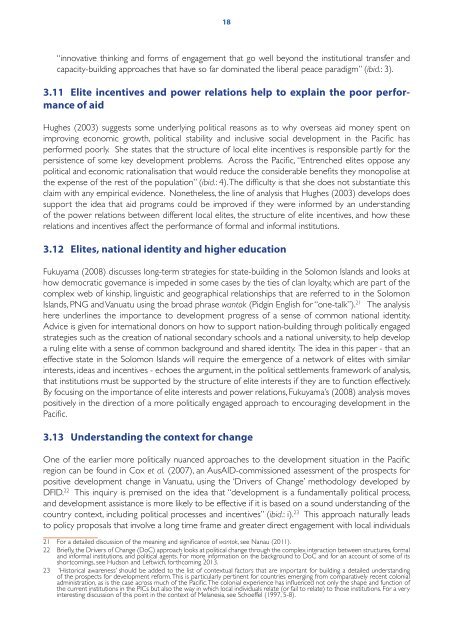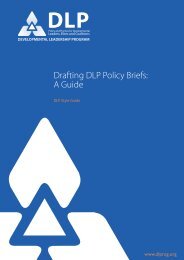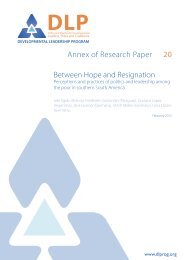VIEW - The Developmental Leadership Program
VIEW - The Developmental Leadership Program
VIEW - The Developmental Leadership Program
Create successful ePaper yourself
Turn your PDF publications into a flip-book with our unique Google optimized e-Paper software.
18“innovative thinking and forms of engagement that go well beyond the institutional transfer andcapacity-building approaches that have so far dominated the liberal peace paradigm” (ibid.: 3).3.11 Elite incentives and power relations help to explain the poor performanceof aidHughes (2003) suggests some underlying political reasons as to why overseas aid money spent onimproving economic growth, political stability and inclusive social development in the Pacific hasperformed poorly. She states that the structure of local elite incentives is responsible partly for thepersistence of some key development problems. Across the Pacific, “Entrenched elites oppose anypolitical and economic rationalisation that would reduce the considerable benefits they monopolise atthe expense of the rest of the population” (ibid.: 4). <strong>The</strong> difficulty is that she does not substantiate thisclaim with any empirical evidence. Nonetheless, the line of analysis that Hughes (2003) develops doessupport the idea that aid programs could be improved if they were informed by an understandingof the power relations between different local elites, the structure of elite incentives, and how theserelations and incentives affect the performance of formal and informal institutions.3.12 Elites, national identity and higher educationFukuyama (2008) discusses long-term strategies for state-building in the Solomon Islands and looks athow democratic governance is impeded in some cases by the ties of clan loyalty, which are part of thecomplex web of kinship, linguistic and geographical relationships that are referred to in the SolomonIslands, PNG and Vanuatu using the broad phrase wantok (Pidgin English for “one-talk”). 21 <strong>The</strong> analysishere underlines the importance to development progress of a sense of common national identity.Advice is given for international donors on how to support nation-building through politically engagedstrategies such as the creation of national secondary schools and a national university, to help developa ruling elite with a sense of common background and shared identity. <strong>The</strong> idea in this paper - that aneffective state in the Solomon Islands will require the emergence of a network of elites with similarinterests, ideas and incentives - echoes the argument, in the political settlements framework of analysis,that institutions must be supported by the structure of elite interests if they are to function effectively.By focusing on the importance of elite interests and power relations, Fukuyama’s (2008) analysis movespositively in the direction of a more politically engaged approach to encouraging development in thePacific.3.13 Understanding the context for changeOne of the earlier more politically nuanced approaches to the development situation in the Pacificregion can be found in Cox et al. (2007), an AusAID-commissioned assessment of the prospects forpositive development change in Vanuatu, using the ‘Drivers of Change’ methodology developed byDFID. 22 This inquiry is premised on the idea that “development is a fundamentally political process,and development assistance is more likely to be effective if it is based on a sound understanding of thecountry context, including political processes and incentives” (ibid.: i). 23 This approach naturally leadsto policy proposals that involve a long time frame and greater direct engagement with local individuals21 For a detailed discussion of the meaning and significance of wantok, see Nanau (2011).22 Briefly, the Drivers of Change (DoC) approach looks at political change through the complex interaction between structures, formaland informal institutions, and political agents. For more information on the background to DoC and for an account of some of itsshortcomings, see Hudson and Leftwich, forthcoming 2013.23 ‘Historical awareness’ should be added to the list of contextual factors that are important for building a detailed understandingof the prospects for development reform. This is particularly pertinent for countries emerging from comparatively recent colonialadministration, as is the case across much of the Pacific. <strong>The</strong> colonial experience has influenced not only the shape and function ofthe current institutions in the PICs but also the way in which local individuals relate (or fail to relate) to those institutions. For a veryinteresting discussion of this point in the context of Melanesia, see Schoeffel (1997, 5-8).




